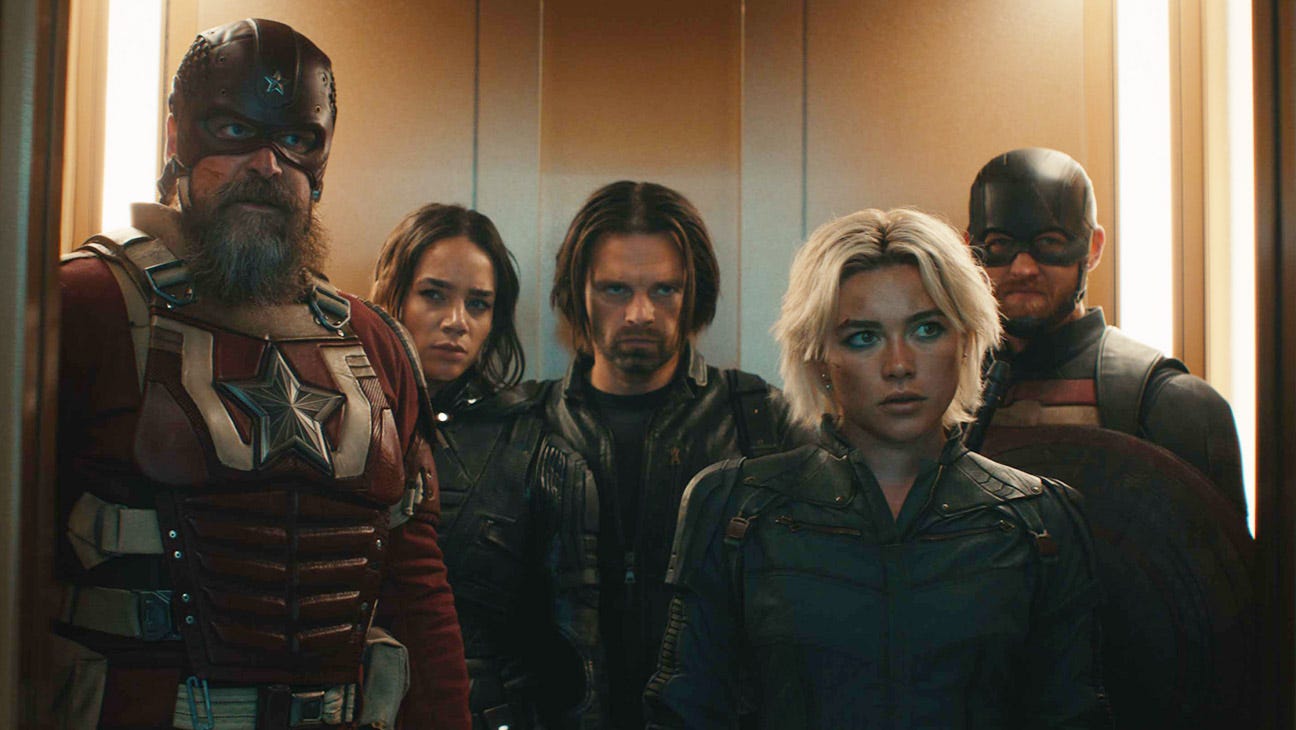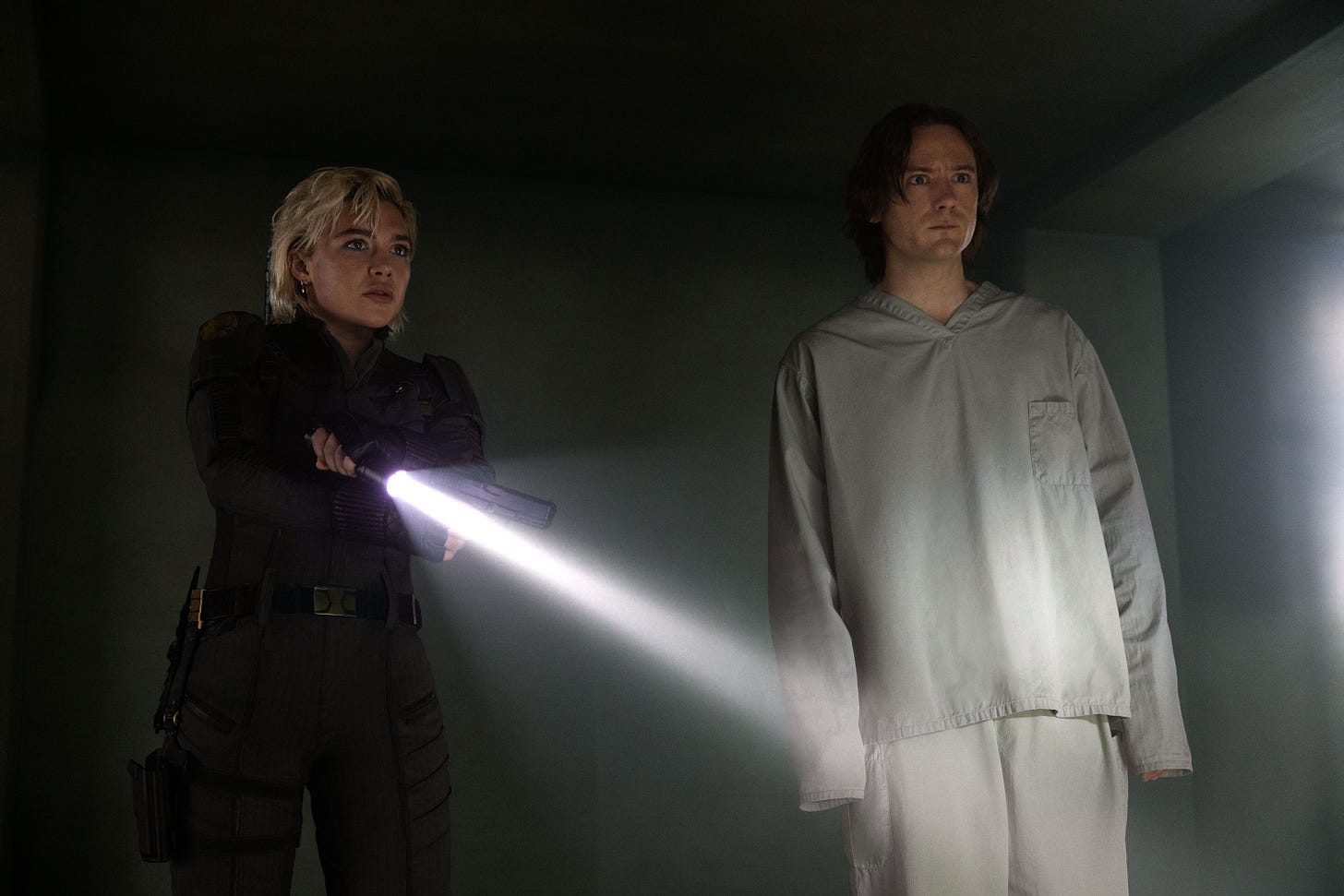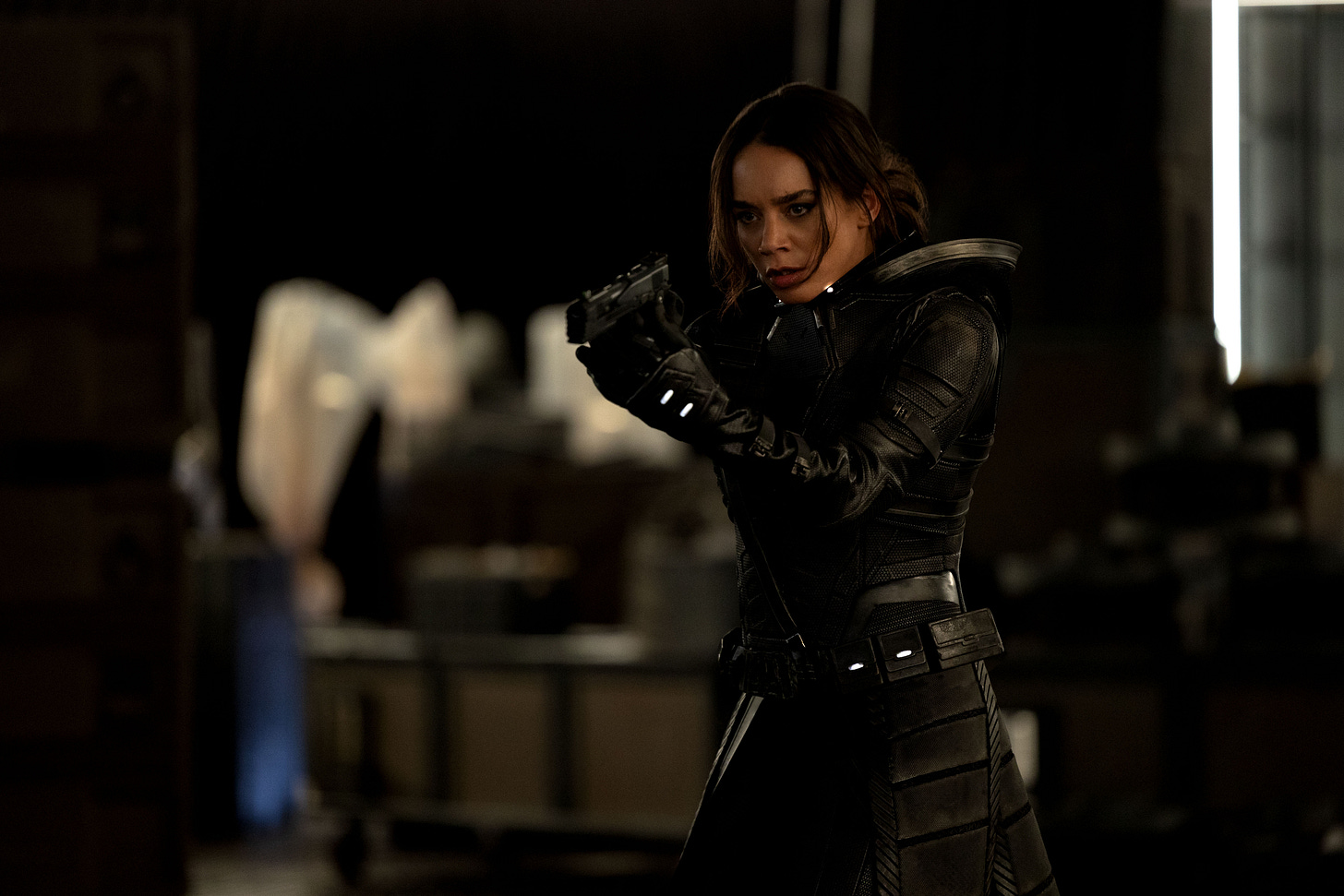Thunderbolts*: The Off-Balance Review.
There is always something worth fighting for.

There is no denying that the past few years of the Marvel Cinematic Universe (MCU) have seen the franchise openly struggle in establishing a consistent creative presence, caught as it is between individualism and larger obligation.
And at a glance, its latest film, Thunderbolts* (the finale of Phase Five) would once again find itself stuck on both sides of that corporate fence.
But even throughout its marketing campaign, there was a front-facing distinction present that made it clear the film, one way or another, simply wasn’t going to fit comfortably into any one box, at least, not entirely.
Taking those well-worn expectations and working to invert them, in presenting a story and characters both not afraid, to success, to challenge now well-trodden superhero convention.
Even in the midst of battling an impeachment trial, C.I.A director Valentina Allegra de Fontaine (Julia Louis-Dreyfus) has never been one to go into a fight without a few tricks up her sleeve.
In this spirit, she sends out the various anti-hero operatives on her payroll to destroy the paper trail relating to her involvement in the so-called “Sentry”program - a dangerous human-experimentation ring of which any public knowledge would most assuredly see her sent to prison.
But as Yelena Belova/Black Widow (Florence Pugh), John Walker/U.S Agent (Wyatt Russell) and Ava Starr/Ghost (Hannah John-Kamen), all battling personal demons of their own quickly learn, from Sentry emerged Robert “Bob” Reynolds (Lewis Pullman): a mentally precarious man bestowed incredible and rapidly developing superpowers whom Valentina wishes to manipulate to her political advantage.
So joined by former Avenger-turned congressman Bucky Barnes/The Winter Solider (Sebastian Stan) and Yelena’s adoptive father, Alexei Shostakov/Red Guardian (David Harbour), the group, dubbing themselves the Thunderbolts, realize that in order to stop Valentina’s scheming and protect Bob, they must learn to not just work together but face their pasts, as well.
Heroism, despite it all, something they’re capable of.
On the surface, yes, this isn’t a wholly inventive set-up.
What sets Thunderbolts* apart from the broader MCU film fare as of late however, is that rather than being driven by pure spectacle or the faraway promise of it, is that it is a character film, first and foremost.

Sure, as the 36th film in this franchise, pulling on a variety of threads, including quite a few on the TV side, it is understood that the viewer has the appropriate amount of foreknowledge going in, as it relates to the ensemble and their personal dynamics.
The film’s opening act does a little heavy lifting but with the exception of Bob, their stories are all continuing from various prior projects - that oft-heard “homework” critique that even MCU boss Kevin Feige has reportedly acknowledged.
The difference however, compared to say, Captain America: Brave New World or the unavoidable side-by-siding to another anti-hero effort, that being DC’s 2021 The Suicide Squad, is that this character action in Thunderbolts* isn’t just a weak substitute for plot or in the latter case, a foundation for something more overtly comedic in tone.
Instead, it is the driving force of the entire enterprise, interwoven directly into what the film presents both and narratively and thematically.
And even when the stakes rise, naturally, in the third act, that focus doesn’t waver.
There is a threat to be stopped, yes though it is not directly overlaid with mindless fisticuffs - rather, there is culmination of everything presented previously. Mental health struggles, a commitment to individual self-worth and the importance of trusting and working with others.
Be it Walker, Ghost and to a lesser extent Bucky, though very much secondary players in the ensemble, in their own ways, challenged to find a modicum of peace within themselves. Russell, working to slowly peel away Walker’s frat-bro facade, John-Kamen, Ghost’s misanthropy and Bucky, having mostly come to terms with his past already, is something of a reluctant mentor to his burgeoning teammates, Walker, in particular of which Stan gives a weathered but quiet energy too.
Elsewhere, as Louis-Dreyfus continues to play up Valentina as an immortal, whatever-it-takes power broker, it contrasts nicely against her assistant, Mel (Geraldine Viswanathan), who struggles to toe the inhumane line her job requires.
Given more prominence, comparatively, is Harbour’s Alexei.
He is desperate to have Yelena be apart of his life and relive his glory days but struggles to communicate either wish effectively, leading to continued tension with his adopted daughter, to his great sadness. As has been the case previously, outside of the usual humorous jabs overall, the character at large is the comedic element in the room but surprisingly, given the traditional MCU template, this isn’t too overdone.
He never feels too grating and when given a few emotional beats to hit, Harbour does so well.
But the true heart of Thunderbolts*?
It is the duo of Pugh and Pullman.

As the film begins, Yelena, by her own admission, is aimless.
She still carries the grief from the loss of her sister and internally rages against her strained relationship with Alexei, while finding no purpose in Valentina’s black ops work. And although she fights against the realization, she wants nothing more than to embrace the humanity she hasn’t totally buried.
Seeing then, something of a kindred spirit in Bob, who she comes to sympathize with, despite the rest of the team’s hesitation. While Bob’s arc, that of confronting and ultimately battling depression and personal demons, even with its super-powered trappings, immediately brings the viewer in. Relatable and honest, while not feeling too manipulative: a harder ask than it might seem, for director Jake Schreier and credited writers, Eric Pearson and Joanna Calo, given how he is introduced and just how his backstory unfolds.
Yet both individually and within their shared dynamic Pugh and Pullman find a noticeable emotional maturity in how they approach and deliver on their characters.
Pugh, in angst, Pullman, from apathetic self-loathing to something else entirely.
Meanwhile, in a clearly conscious effort to break away from the CGI-heavy mold that defines most superhero outings, the pivot towards more practical effects and stunt work is clear here.
The film’s opening sequence, a key point of the marketing, featuring Pugh’s Yelena jumping from the Merdeka 118 skyscraper, the second tallest building in the world, was actually completed practically, by Pugh, with rigging and wire-work, rather than being thrown into the green screen blender. It is a level of creative application that is readily apparent throughout the film, even with, despite those after-mentioned highs, the broader thematic notes can occasionally come across as predictable and heavy-handed.
Visually, nothing truly shines save for portions of the third act and like Daredevil: Born Again before it, for better or worse, as trouble brews in New York City the absence of other heroes, including one in particular, even in what could be nothing but an off-hand cameo, is an itch that just can’t be scratched (thanks for that, Sony).
Yet all-in-all, Thunderbolts* successfully opposes the “superhero fatigue” argument, in its own way.
A reminder again, that, obvious as it seems, quality, not poorly-fitting quantity will always win out.
Yes, while it inevitably ties itself back into the larger MCU, it does so not with hypotheticals but something more actively tangible (even if the reveal of just where the titular team ends up, at the film’s close, has, bizarrely, become the immediate crux of the post-release marketing).
But it lands thematically, is led by strong performances and does as well as it can narratively, as a partial, kinda-sorta standalone effort.
Not the best-of-the-best no but easily a standout of the past few years of the MCU’s big-screen efforts. More so, as Phase Six looms and with it, grand cosmic uncertainty as Thunderbolts* does all it can to be a film with staying power on its own merits.
And on that front, well, mission very much accomplished.






Great piece and surprising rating, Ryan! I like how you pointed out the character forward lens of this film as opposed to others in the franchise. Though I probably won't venture out to go see it (need to prioritize Sinners IMAX first and already got my Marvel fill with brave New World in theaters) your writing really brought me into the storyline and very thoughtfully so. Nicely done.
Any other films you are looking forward to this month?